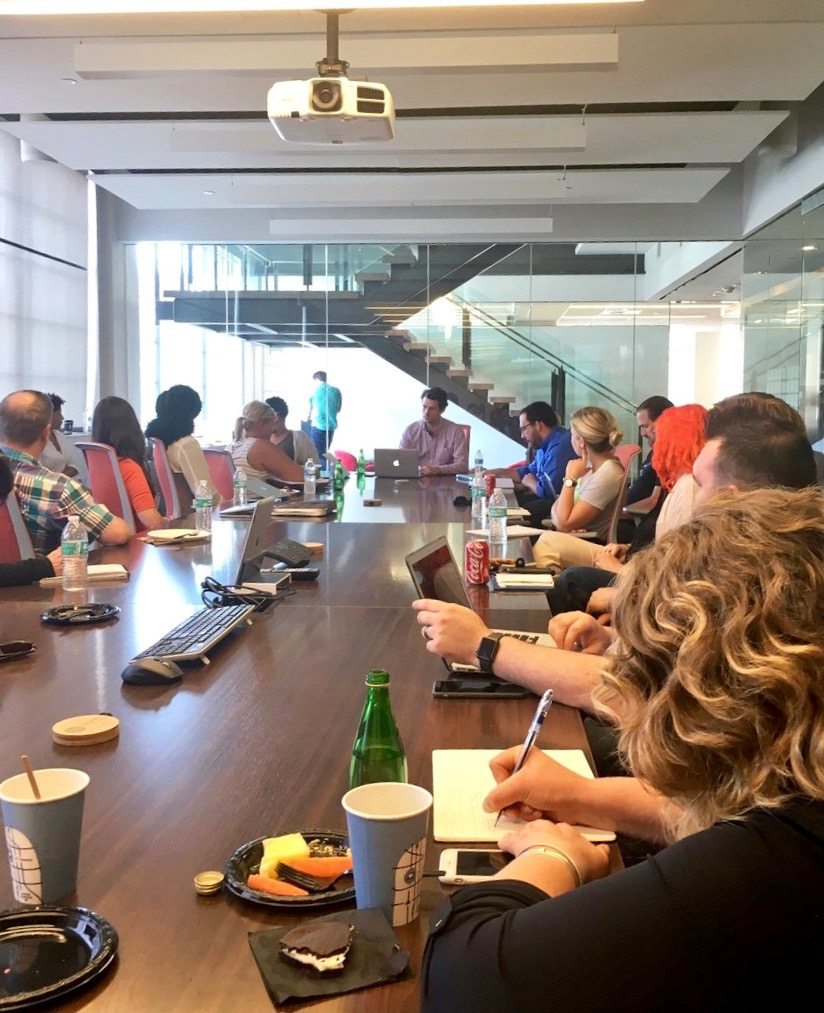There are plenty of metrics that indicate Baltimore’s startup scene is growing, but it’s worth reflecting on how that expansion is happening. Behind each one of those stats lies a community that’s leaning on each other, and challenging each other when necessary.
Take jobs.
Tech businesses that started small now post the kind of fast growth where they need to hire quickly. It’s a mark of the community that a business like Mindgrub can hire 20 people just by reaching out to their network.
“We have not yet used a recruiter at Mindgrub,” said Kelly Brown, the Locust Point-based agency’s internal marketing manager. She joined the company among that uptick, which in turn followed its official relocation into the city.
Brown was one of the leaders convened by Technical.ly in June for a stakeholder meeting to consider the state of the community as we gear up for Baltimore Innovation Week 2016 in the fall. We’ll be continuing the conversation at Super Meetup on Tuesday night, and during a Twitter chat about #BIW16 on Thursday.
Along with the companies themselves, the boundaries of the technology community are also expanding. In Baltimore, new faces are joining the tech scene amid efforts to include people from a wider variety of backgrounds into a field that is notoriously while and male, and the city’s academic and creative communities are increasingly embracing entrepreneurship.
At this point, tech’s expansion can be felt on the neighborhood level. The success of incubators like the Emerging Technology Centers and Betamore as the cornerstones of block-level economic development led to other hubs opening at a rapid clip in neighborhoods where tech hasn’t previously taken root. On a grander scale, ambitious efforts like Innovation Village in West Baltimore and Kevin Plank’s redevelopment of Port Covington are running with the idea that startups are a key foundation to attract anchor corporations.
Even in the relatively short post-recession window, there are examples to draw on to show the way. While the central business district has been a center for offices, it’s only recently been pegged on the map for startups and their requisite live-work-play balance. The Downtown Partnership of Baltimore played a role in connecting each of those threads, with Caroline Peri and other team members there not only showing startups where their office could be, but working to increase retail and food options that they would want to partake in outside of work.
It's important that we shift the narrative a little bit to focus more on the efforts that are happening at the grassroots level.
“I think the best thing we do is we meet with anybody who needs help. Whoever at our organization is the most capable of helping them, we’ll walk you through the process,” said Lauren Hamilton, Downtown Partnership’s marketing director. Providing connections to other organizations has also been key, she said.
In a city grappling with massive disparities and the continued effects of institutional racism, it’s important to make sure that what’s good for startups is also good for the wider community.
“I think we also really need to be talking about bringing in people and saying, ‘What do you need in your neighborhood?’ as opposed to coming from a top-down perspective and telling people what they need to innovate,” said Charlotte James, communications director at the nonprofit Code in the Schools.
Bringing more people from the community to tables like the one where she was sitting is key to identifying those needs. She said the work of organizations like NPower and Innovation Village are providing new entry points for tech talent, but social capital and basic resources like WiFi are just as important. “It’s important that we shift the narrative a little bit to focus more on the efforts that are happening at the grassroots level,” James said.
There is a variety of industry here that is almost unmatched.
With the growth, it’s also worth considering whether the ways that the community frequently defines itself still hold.
Conversations about Baltimore’s tech scene often start with the four pillars of edtech, adtech, health and cybersecurity. Some of the attendees at the June meeting, such as Pure Bang Games founder (and organizer of this weekend’s annual indie gaming showcase, Gamescape) Ben Walsh bristled at the rigid definition. He pointed to the creative talent in the city, prompting ETC President Deb Tillett to point out that games and other tech staples need that creative energy for their full appeal.
“It’s still pretty rare to see the creatives and technologists come together to build cool products,” Walsh said.
By nature, the idea of creative resists the rigid defining that would allow it to fit into a box to be sealed and exported. But Mike Binko, an entrepreneur who also spearheaded the Startup Maryland bus tour around the state to promote entrepreneurs, offered a way to define the collection of artists, designers and myriad other boundary-pushers: “Creative undercurrent.”
“We feel that the creative undercurrent in Baltimore is an untapped, main strength that folks outside of Baltimore, if they knew it was here, it might bring more business to the city,” Binko said. By the same turn, those four pillars could leave others potentially interested out of the conversation.
Speaking in more broad strokes can provide room to represent all that is here.
“We’re seen as eds, feds, meds and now maybe cyber,” Binko said. “But what we’ve found … is that there is a variety of industry here that is almost unmatched.”
Join the conversation!
Find news, events, jobs and people who share your interests on Technical.ly's open community Slack

Baltimore daily roundup: An HBCU innovation champion's journey; Sen. Sanders visits Morgan State; Humane Ai review debate

Baltimore daily roundup: Medtech made in Baltimore; Sen. Sanders visits Morgan State; Humane Ai review debate

Baltimore daily roundup: The city's new esports lab; a conference in Wilmington; GBC reports $4B of economic activity


